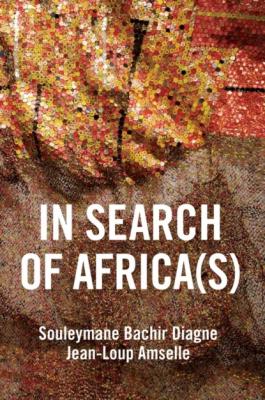In Search of Africa(s). Souleymane Bachir Diagne
Читать онлайн.| Название | In Search of Africa(s) |
|---|---|
| Автор произведения | Souleymane Bachir Diagne |
| Жанр | Языкознание |
| Серия | |
| Издательство | Языкознание |
| Год выпуска | 0 |
| isbn | 9781509540303 |
7 7. This ambiguity is particularly apparent with regard to the State of Israel, which can be seen as both an exemplary democracy and a racist state. See Zeev Sternhell, ‘En Isräel pousse un racisme proche du nazisme à ses débuts’, Le Monde, 18 February 2018, https://www.lemonde.fr/idees/article/2018/02/18/zeev-sternhell-en-israel-pousse-un-racisme-proche-du-nazisme-a-ses-debuts_5258673_3232.html.
8 8. Ali and Dayan-Herzbrun (eds), Pluriversalisme décolonial.
9 9. Jean-Loup Amselle, L’Occident décroché: enquête sur les postcolonialismes (Paris: Fayard/Pluriel, 2011; first published in 2008), chap. 6, ‘La voix des “sans-voix”’.
10 10. Vivek Chibber, ‘L’universalisme, une arme pour la gauche’, Le Monde diplomatique, May 2014, https://www.monde-diplomatique.fr/2014/05/CHIBBER/50380; Vivek Chibber, ‘Postcolonialism vs Marxism’, https://www.youtube.com/watch?v=r1tvVTfeikg; see also Vasant Kaiwar, L’Orient postcolonial: sur la ‘provincialisation’ de l’Europe et la théorie postcoloniale (Paris: Syllepse, Mille marxismes, 2013).
11 11. Nivedita Majumdar, ‘Silencing the Subaltern’, Catalyst Journal, vol. 1, no. 1, Spring 2017, https://catalyst-journal.com/vol1/no1/silencing-the-subaltern.
12 12. Kwame Anthony Appiah, Cosmopolitanism: Ethics in a World of Strangers (New York: W. W. Norton & Co. Inc., 2006); The Ethics of Identity (Princeton, NJ: Princeton University Press, 2005).
13 13. An ethnic group in south Ghana.
14 14. Kwasi Wiredu,Cultural Universals and Particulars: An African Perspective (Bloomington: Indiana University Press, 1996), chap. 7, pp. 137–47.
15 15. See chap. 7 below, pp. 60–6.
16 16. Maurice Merleau-Ponty, ‘Rapport de Maurice Merleau-Ponty pour la création d’une chaire d’Anthropologie sociale’ (1958), La Lettre du Collège de France, special issue no. 2, 2008, https://journals.openedition.org/lettre-cdf/229.
17 17. Maurice Merleau-Ponty, Phenomenology of Perception, translated by Donald A. Landes, new edn (London: Routledge, 2012). See also Claude Lévi-Strauss, The Elementary Structures of Kinship, edited by Rodney Needham; translated by James Harle Bell, John Richard von Sturmer and Rodney Needham, revised edn (London: Social Science Paperbacks in association with Eyre & Spottiswoode, 1970).
18 18. Merleau-Ponty, ‘Rapport de Maurice Merleau-Ponty’, para. 13.
19 19. Claude Lévi-Strauss, The Savage Mind, new edn (London: Weidenfeld & Nicolson, 1974).
20 20. Maurice Merleau-Ponty, Signs, translated by Richard C. McCleary (Evanston, IL: Northwestern University Press, 1964).
21 21. ‘Emotion is Negro, as reason is Hellenic.’ In Diagne’s view, these are two forms of thought found in all cultures. Personally, I sense the influence of Gobineau here – though, from my point of view, this is by no means to denigrate Senghor’s thought. See Souleymane Bachir Diagne, ‘Penser de langue à langue’, in Alain Mabanckou (ed.), Penser et écrire l’Afrique aujourd’hui (Paris: Le Seuil, 2017), p. 74.
22 22. ‘If a philosophy of the future exists, it will have to be born outside of Europe, or as a consequence of the encounters […] between Europe and non-Europe,’ quoted in Jeremy R. Carrette (ed.), Religion and Culture: Michel Foucault (New York: Routledge, 1999), p. 113.
23 23. Merleau-Ponty, ‘Everywhere and Nowhere’, in Signs, p. 139. See also Anthony Mangeon (ed.), Anthropolitiques: Jean-Loup Amselle, une pensée sans concessions (Paris: Karthala, 2015), p. 8, note 1.
24 24. See Amselle, L’Occident décroché on the connections between primitivism and postcolonialism.
25 25. I am drawing here on the analysis of Levinas’s work in Jean-Marc Narbonne,Levinas et l’héritage grec (Paris: Vrin and Presses de l’Université Laval, 2004), pp. 90, 111, 112, 116 (quotation from pp. 111–12).
26 26. Emmanuel Levinas, Humanism of the Other, translated by Nidra Poller (Urbana: University of Illinois Press, 2003), p. 60 (translation modified).
27 27. Gottfried Wilhelm Leibniz, ‘Monadology’, in Leibniz, Discourse on Metaphysics and other Essays, translated by Danile Garber and Roger Ariew (Indianapolis, IN: Hackett, 1991). On Diagne’s thought as a kind of theology, see Anthony Mangeon, La Pensée noire et l’Occident (Cabris: Sulliver, 2010), p. 141.
28 28. On the ‘opacity’ of cultures, as Édouard Glissant puts it, see his Le Discours antillais (Paris: Gallimard, 1997). On Barbara Cassin’s views on ‘untranslatability’, see Entretien avec Barbara Cassin réalisé par Colette Briffard, http://www.revue-texto.net/Dialogues/Cassin_interview.html; see also Barbara Cassin (ed.), Dictionary of Untranslatables: A Philosophical Lexicon, translated by Steven Rendall et al. (Princeton, NJ: Princeton University Press, 2014) and her Éloge de la traduction: compliquer l’universel (Paris: Fayard, 2016). François Jullien puts forward in his many different books the view (close to that of Merleau-Ponty) that European culture can be observed ‘from’ the standpoint of Chinese culture.
29 29. Eric Hobsbawm and Terence Ranger (eds), The Invention of Tradition (Cambridge: Cambridge University Press, 1983).
30 30. Eduardo Viveiros de Castro, ‘Perspectivism and Multinaturalism in Indigenous America’, in Alexandre Surrallés and Pedro García Hierro (eds), The Land Within: Indigenous Territory and Perception of the Environment (Copenhagen: IWGIA, 2005).
31 31. Laure Noualhat, ‘Attac: Pachamama mia!’, Libération, 23 August 2010, https://www.liberation.fr/terre/2010/08/23/attac-pachamama-mia_673655; Ramón Grosfoguel, ‘Decolonizing Postcolonial Studies and Paradigms of Political Economy: Transmodernity, Decolonial Thinking, and Global Modernity’, http://dialogoglobal.com/texts/grosfoguel/Grosfoguel-Decolonizing-Pol-Econ-and-Postcolonial.pdf. See also the article by Maëlle Mariette, ‘À la recherche de la Pachamama’, Le Monde diplomatique, March 2018, https://www.monde-diplomatique.fr/2018/03/MARIETTE/58464.
32 32. Jean-Loup Amselle and Elikia M’Bokolo (eds), Au coeur de l’ethnie: ethnies, tribalisme et État en Afrique (Paris: La Découverte, 1999).
33 33. Jean-Loup Amselle, Mestizo Logics: Anthropology of Identity in Africa and Elsewhere, translated by Claudia Royal (Stanford, CA: Stanford University Press, 1998).
34 34. Jean-Loup Amselle, Branchements: anthropologie de l’universalité des cultures, 3rd edn (Paris: Flammarion, 2015).
35 35. See the interesting debate that I had with Diagne at the ‘Cité Philo’ (Lille, November 2014) and which was rebroadcast as part of the ‘Chemins de la connaissance’ (‘Paths of Knowledge’) series: the topic was whether Africa invented human rights (‘Penseurs d’Afrique [2/5]: L’Afrique a-t-elle inventé les droits de l’homme’, https://www.franceculture.fr/emissions/les-nouveaux-chemins-de-la-connaissance/penseurs-d-afrique-25-l-afrique-t-elle-invente-les).
36 36.
